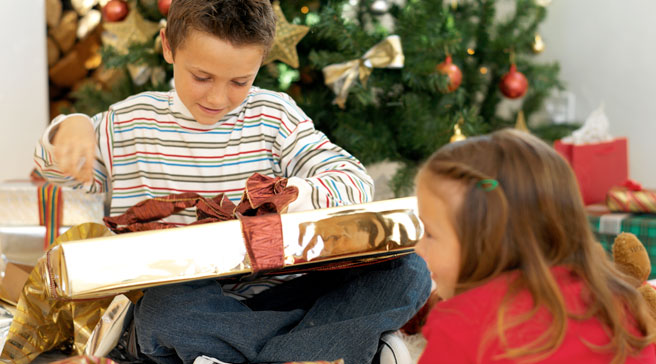Should we spoil kids at Christmas?
Children can learn valuable lessons about generosity at Christmas, if we can avoid over-indulging, says Isabelle Taubes

Children today don’t even have time to dream of owning things: they believe that gifts are their due – and parents often don’t do enough to dispel this myth. The latest Nintendo DS, video games, dancing robots, talking dolls… there’s no sacrifice we won’t make to provide them with the things they want.
But are we doing our children any favours by transforming their bedrooms into toyshops? We spoke to psychologists and paediatricians Didier Pleux, Anne Gatecel, Stéphane Clerget and Danielle Dalloz.
Q Why do we spoil our children so much at Christmas?
We’re surrounded by articles, adverts and offers that centre on the idea that happiness and spending are linked and that possessions allow us to enjoy life. Because we are told that our children’s happiness is dependent on what they own, it’s easy to feel that to be good parents we need to take part in this constant consumption. These days, words such as ‘frustration’ and ‘absence’ scare us.
But parents are doing their children a disservice by confusing what they really need with a passing desire. Children will feel inadequate when they see that a cousin or best friend has been more indulged than they have. Buying gifts is often a way of assuaging our own guilt at being absent, either because we’re involved in our careers or too wrapped up in everyday problems. This pattern of behaviour is a mistake. Children will interpret it to mean ‘I’m offering you all these gifts so I must be thinking of you’.
Christmas is a time when we all revert to our own childhoods. The more we feel we were deprived of things as children, the more we want to provide for our own kids. On the other hand, those who were overloaded with gifts as children know full well that happiness does not lie in excess. All the same, many of the presents that we buy for our children are expressions of the things that we would have liked to own.
Q How is this excess harmful?
A child can end up believing that a constant stream of presents is the most reliable way of showing love or feeling valued. If this happens, they will lose the ability to draw a distinction between affection, money and gifts. They may not be interested in anyone who turns up without bringing them a present. By focusing on the material value of an object that they’re given, a child may struggle to understand the symbolic value of a gift and the importance of the act of giving.
Q Should Christmas gifts be a reward for good behaviour or good marks at school?
Exchanging gifts at Christmas is one of the few rituals we have left and it shouldn’t be carried out on a conditional basis. There are many situations more suited to disciplining children or rewarding good behaviour than a day of celebration. Christmas is a day to come together as a family and it’s wiser to use this situation to teach a child about the pleasure of giving and receiving.
Q How can you make sure that children don’t take receiving gifts for granted?
Children will only take presents for granted if we continually smother them with gifts, the majority of which they won’t pay much attention to, or if we allow them to think that presents are their due. Instead, it’s important to give them time to express the things they would like, without these wishes being fulfilled immediately.
This is how they learn to dream, to imagine themselves in the future, to mark out the moment that their desires are satisfied and not to have a tantrum when they don’t get what they want. It’s this that teaches children that they are not all-powerful – something that young children believe – and allows them to become adults. This is a part of a greater learning process that takes place every day and not just at Christmas.









